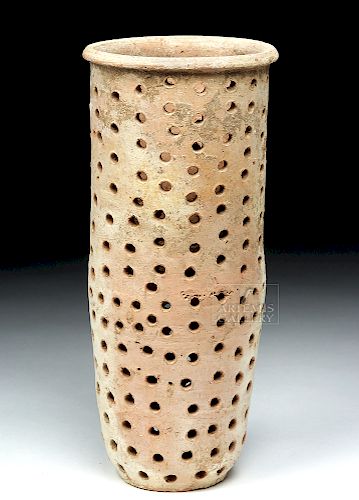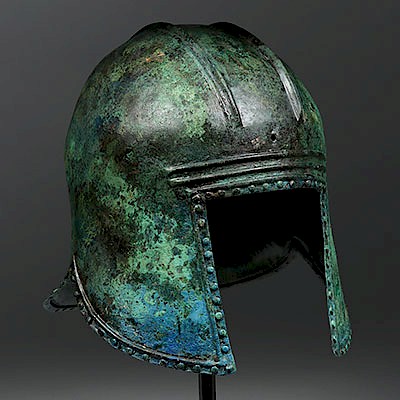Rare Near Eastern Terracotta Beer Sieve - TL Tested
Lot 92b
About Seller
Artemis Gallery
686 S Taylor Ave, Ste 106
Louisville, CO 80027
United States
Selling antiquities, ancient and ethnographic art online since 1993, Artemis Gallery specializes in Classical Antiquities (Egyptian, Greek, Roman, Near Eastern), Asian, Pre-Columbian, African / Tribal / Oceanographic art. Our extensive inventory includes pottery, stone, metal, wood, glass and textil...Read more
Categories
Estimate:
$1,500 - $2,000
Absentee vs Live bid
Two ways to bid:
- Leave a max absentee bid and the platform will bid on your behalf up to your maximum bid during the live auction.
- Bid live during the auction and your bids will be submitted real-time to the auctioneer.
Bid Increments
| Price | Bid Increment |
|---|---|
| $0 | $25 |
| $300 | $50 |
| $1,000 | $100 |
| $2,000 | $250 |
| $5,000 | $500 |
| $10,000 | $1,000 |
| $20,000 | $2,500 |
| $50,000 | $5,000 |
| $100,000 | $10,000 |
| $200,000 | $20,000 |
About Auction
By Artemis Gallery
May 10, 2018
Set Reminder
2018-05-10 10:00:00
2018-05-10 10:00:00
America/New_York
Bidsquare
Bidsquare : Fine Ethnographic / Asian / Ancient Art
https://www.bidsquare.com/auctions/artemis-gallery/fine-ethnographic-asian-ancient-art-3213
Featuring antiquities from around the world including Pre-Columbian, Tribal, Classical, Asian, so much more! Artemis Gallery info@artemisgallery.com
Featuring antiquities from around the world including Pre-Columbian, Tribal, Classical, Asian, so much more! Artemis Gallery info@artemisgallery.com
- Lot Description
Ancient Near East, Holy Land, Iron Age II, ca. late 8th to early 7th century BCE. A tall terracotta beer strainer used to separate solid ingredients from the liquid inside of a larger vessel. This sieve would have been first placed inside a vessel, stuffed with fermentable material, and covered with water and other liquids before sealing. Once the beer had been prepared or was to be moved to another vessel, the sieve would be removed and pressed to extract any remaining liquids. This example is designed with a flat base, tall walls, a deep interior cavity, and a rolled rim. Dozens of minute perforations cover the walls and base, with the rim and exterior surfaces decorated with a solid white slip. Sieve examples like this may have been used in bakeries as well since both breweries and bakeries were typically housed under one roof. The overall size and intact construction of this vessel makes it an exceptionally rare example from the ancient Near East! Size: 4.875" W x 11.375" H (12.4 cm x 28.9 cm).
This piece has been tested using thermoluminescence (TL) and has been found to be ancient and of the period stated. A full report will accompany purchase.
Provenance: ex-private Cypress, Texas, USA collection
All items legal to buy/sell under U.S. Statute covering cultural patrimony Code 2600, CHAPTER 14, and are guaranteed to be as described or your money back.
A Certificate of Authenticity will accompany all winning bids.
We ship worldwide and handle all shipping in-house for your convenience.
#132716Surface wear and abrasions commensurate with age and use as expected, one stable hairline fissure just beneath rim, light discoloration, minute nicks to body, base, and rim, with fading to slip color. Light earthen deposits throughout. Two TL drill holes, one beneath rim and the other beneath base.Condition
- Shipping Info
-
All shipping is handled in-house for your convenience. Your invoice from Artemis Gallery will include shipping calculation instructions. If in doubt, please inquire BEFORE bidding for estimated shipping costs for individual items.
-
- Buyer's Premium



 EUR
EUR CAD
CAD AUD
AUD GBP
GBP MXN
MXN HKD
HKD CNY
CNY MYR
MYR SEK
SEK SGD
SGD CHF
CHF THB
THB

















